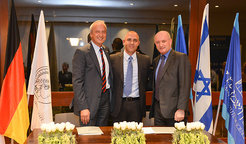Max Planck neuroscientists strengthen cooperation with Israeli Weizmann Institute
A joint Laboratory promotes research in the field of psychiatric diseases
Max Planck neuroscientists further their partnership with Israeli researchers. They will now jointly investigate the underlying mechanisms of neuropsychiatric disorders such as depression, schizophrenia, anxiety and autism.

Peter Gruss, President of the Max Planck Society, and Daniel Zajfman, President of the Weizmann Institute of Science, signed a cooperation agreement to inaugurate the "Max Planck – Weizmann Laboratory for Experimental Neuropsychiatry and Behavioral Neurogenetics" on Tuesday, March 4, 2014. Alon Chen, Director at the Max Planck Institute of Psychiatry, initiated this further cooperation of both institutions. Under his lead, a committee will be established to promote and support the joint scientific activities.
The Laboratory situated at the Weizmann Institute of Science in Rehovot will address one of the looming issues of this century: the causes of cognitive, emotional, behavioral and neurological disorders. About 450 million people worldwide suffer from some form of psychiatric diseases. It is becoming increasingly clear that these disorders arise from a complex interplay between genetics and the environment. The field of neuropsychiatry attempts to untangle this relationship and to understand the processes by which genetic makeup and variations in physical brain structure lead to disease.
Using a multidisciplinary approach, which is necessary to study complex mental disorders, the joint Laboratory aims to advance the understanding and treatment of complex brain disorders such as depression, schizophrenia, anxiety, autism and other related psychopathologies. Researchers will combine clinical assessment procedures with state of the art neuroscientific methods and genomic analyses.
The "Max Planck – Weizmann Laboratory for Experimental Neuropsychiatry and Behavioral Neurogenetics" will support collaborative research projects between scientists at the two institutes, host joint seminars and symposia, arrange exchanges of visiting scientists and students, and create opportunities for research students to get joint training.
AN/JE
